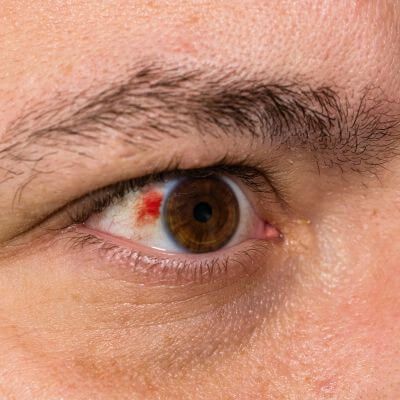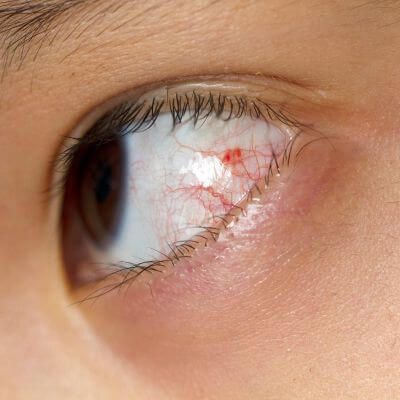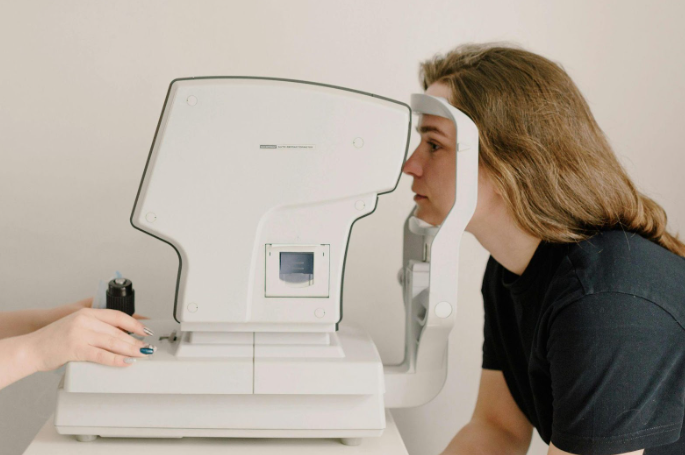Can I Make a Broken Blood Vessel In My Eye Heal Faster?
We’ve all had irritated, bloodshot eyes at one time or another. This could be from too little sleep, allergies, or dry eyes. The redness typically goes away with eye drops, a good night’s rest, or allergy medication. But if you have a lingering red spot on your eye, you may wonder, “Can I make a broken blood vessel in my eye heal faster?”
Broken blood vessels in the eye usually heal on their own. Lubricating eye drops treat any minor discomfort you may experience during this process. One of the best ways to prevent them is by wearing eye safety equipment. Blood vessels can break for many reasons, including trauma or high blood pressure.
How Can I Make a Broken Blood Vessel In My Eye Heal Faster?
You can’t make a broken blood vessel in your eye heal faster, but the eye usually heals on its own with time. Lubricating eye drops may help relieve any minor irritation you may feel.
Avoid “redness relieving” or “whitening” eye drops. They cause blood vessels to constrict and can cause a rebound reddening effect.
In truth, it will just take time for blood in the eye to be reabsorbed and the red spot to go away. This may take between a few days to three weeks depending on the size of the burst blood vessel in the eye.
With that said, it’s still a good idea to schedule an appointment with your eye doctor. In most cases, a simple eye exam is enough for an eye doctor to properly diagnose a popped blood vessel in the eye. However, he or she will want to be sure that damage has not occurred to other structures in your eye.
Your eye doctor will ask you about your:
- Medical history
- Medications you take regularly
- Recent activities that may be causing broken blood vessels in your eyes
Certain medical conditions can cause broken blood vessels in the eye. Treating these undiagnosed health issues will help prevent future burst blood vessels. Sometimes the cause of a broken blood vessel in your eye isn’t known. In other cases, it may not be a rare, one-time thing. Your doctor may perform tests to rule out conditions that cause bleeding or affect how your blood clots.
Preventing Popped Blood Vessels in Your Eye
Sometimes broken blood vessels in your eye can be prevented. Wear eye protection during sports or other activities that might cause eye injuries. You should also wear eye protection when exposed to flying particles like debris or dust. This includes when doing house or yard work .
What Causes Burst Blood Vessels in the Eye?
A broken blood vessel in your eye is also known as a subconjunctival hemorrhage . The conjunctiva is the thin membrane that covers the front of your eye. The sclera is the thick white outer layer of your eyeball. When tiny blood vessels in the conjunctiva break, the bleeding appears as a bright red spot on the sclera.
Some of the more common causes of broken blood vessels in the eye include:
- Trauma to the eye
- Foreign object in the eye
- Coughing
- Sneezing
- Straining
- Rubbing the eye
- Crying
- Vomiting
- High blood pressure
- Medications such as aspirin or blood thinners like Coumadin
Broken blood vessels seem alarming, but they’re often harmless and often heal on their own. In fact, you probably wouldn’t know you had one until you looked in the mirror or someone pointed it out to you. Occasionally, you may experience a very mild irritation or itching of the eye.
Do you have a burst blood vessel in the eye that needs to be examined? Contact us today to schedule your appointment!

Natural healing is often the best treatment for broken blood vessels in the eye. Use lubricating eye drops to help reduce any discomfort you may experience. Wear protective eyewear during sports, yard work, and other activities to help prevent them. They can also be caused by rubbing the eye too hard, certain medications, or straining.
Baptist Eye Surgeons is an ophthalmological practice in Downtown and West Knoxville , Morristown, TN , and Sevierville, TN . Give us a call at 865-579-3920 for more information or to schedule an appointment .
*This blog was originally published in September of 2019. It has been updated for clarity and relevant medical information.





